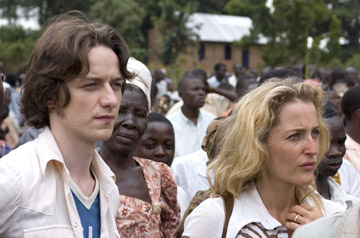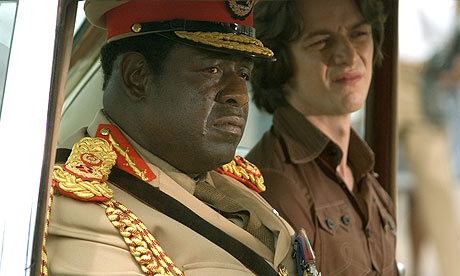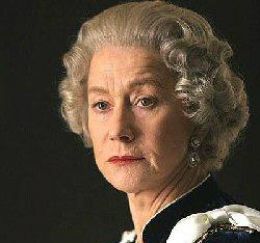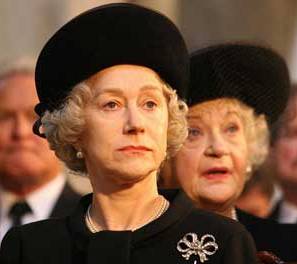“Morgan’s grasp of Nixon’s place in American culture is confirmed near the play’s end, when Reston endorses an opinion that one seldom hears in routine journalistic commentary but that I believe is undoubtedly true: Nixon was never rehabilitated. He never came back. Despite the pomp and fine words at his funeral, his name remained a synonym for presidential corruption and crime, and the ‘-gate’ suffix attached to scandals ever since certified Watergate’s cultural importance” Rutgers professor and author of Nixon’s Shadow David Greenberg reviews Frost/Nixon for Slate.
Tag: Peter Morgan
Hearts in the Highlands.
 All the King’s Men by way of Heart of Darkness (and more than a dash of Hotel Rwanda), Kevin MacDonald’s The Last King of Scotland is a harrowing portrait of the scampish, fun-loving, paranoid, and genocidal Idi Amin, former president/warlord of Uganda, and a moderately engaging cautionary tale about the dangers of seeking to find oneself in a place one doesn’t belong. Somewhat clunkily assembled (despite being co-written by Peter Morgan, screenwriter of The Queen) and suffering from a third act that, like its protagonist, gets lost somewhere amidst its downward trajectory, The Last King of Scotland is a film mostly redeemed by excellent performances — notably Forest Whitaker as Amin and James McAvoy as our (anti-)hero, but also Gillian Anderson, Simon McBurney, and others in supporting roles. It wasn’t quite as good as I was hoping or expecting, but it’s definitely worth a rental — for Whitaker if for nothing else — if you can handle the increasingly graphic carnage of the film’s final hour.
All the King’s Men by way of Heart of Darkness (and more than a dash of Hotel Rwanda), Kevin MacDonald’s The Last King of Scotland is a harrowing portrait of the scampish, fun-loving, paranoid, and genocidal Idi Amin, former president/warlord of Uganda, and a moderately engaging cautionary tale about the dangers of seeking to find oneself in a place one doesn’t belong. Somewhat clunkily assembled (despite being co-written by Peter Morgan, screenwriter of The Queen) and suffering from a third act that, like its protagonist, gets lost somewhere amidst its downward trajectory, The Last King of Scotland is a film mostly redeemed by excellent performances — notably Forest Whitaker as Amin and James McAvoy as our (anti-)hero, but also Gillian Anderson, Simon McBurney, and others in supporting roles. It wasn’t quite as good as I was hoping or expecting, but it’s definitely worth a rental — for Whitaker if for nothing else — if you can handle the increasingly graphic carnage of the film’s final hour.
 As the film begins, it’s 1970, and (the fictional) Nicholas Gerrigan (James McAvoy of The Chronicles of Narnia) is a recently-minted doctor and young, debaucherous Scotsman looking for a life less suffocating than the one on the plate before him, taking over the family practice. Choosing Uganda more or less at random (he spins a globe to choose his fate, but not without first exercising some veto power), Gerrigan soon finds himself one of two doctors on hand in an overworked clinic deep in the African hinterlands, where the only fun to be had is making flagrant passes at his colleague’s do-gooder wife (Gillian Anderson).
As the film begins, it’s 1970, and (the fictional) Nicholas Gerrigan (James McAvoy of The Chronicles of Narnia) is a recently-minted doctor and young, debaucherous Scotsman looking for a life less suffocating than the one on the plate before him, taking over the family practice. Choosing Uganda more or less at random (he spins a globe to choose his fate, but not without first exercising some veto power), Gerrigan soon finds himself one of two doctors on hand in an overworked clinic deep in the African hinterlands, where the only fun to be had is making flagrant passes at his colleague’s do-gooder wife (Gillian Anderson).
Fate rescues Gerrigan from his ennui, however, in the form of a traffic accident — one which brings him to the attention of Uganda’s new leader, the Scotland-adoring Idi Amin (Whitaker). Soon thereafter, Gerrigan has been made Amin’s personal doctor and “closest advisor,” meaning he spends a lot of time dissolute by the pool, unwittingly (and soon deliberately) oblivious to the bloody machinations holding Amin’s regime in power. That is, until his own somewhat-inadvertent complicity in a murder — as well as some really poor life decisions — force Gerrigan to confront the monstrosities laid before him. This place is a prison, he soon discovers, and these people very clearly aren’t his friends.
 As it almost had to be, The Last King of Scotland is most enjoyable in its first hour, as Gerrigan is slowly seduced by the life Amin offers him, and all the sultry pleasures therein included. When it all turns on him, and Gerrigan discovers the heavy price of his fool’s paradise, the film quickly descends into a hell that’s not only hard to watch (one grisly scene brought back unsettling childhood memories of watching…I think it was A Man Called Horse — you’ll know it when you see it) but also somewhat repetitive. How many slo-mo shots of a druggy and/or horrified Gerrigan set to acid-rock do we really need here? Moreover, the film telegraphs one of the good doctor’s key indiscretions for far too long — at least forty minutes is spent simply waiting for the other shoe to drop, so to speak.
As it almost had to be, The Last King of Scotland is most enjoyable in its first hour, as Gerrigan is slowly seduced by the life Amin offers him, and all the sultry pleasures therein included. When it all turns on him, and Gerrigan discovers the heavy price of his fool’s paradise, the film quickly descends into a hell that’s not only hard to watch (one grisly scene brought back unsettling childhood memories of watching…I think it was A Man Called Horse — you’ll know it when you see it) but also somewhat repetitive. How many slo-mo shots of a druggy and/or horrified Gerrigan set to acid-rock do we really need here? Moreover, the film telegraphs one of the good doctor’s key indiscretions for far too long — at least forty minutes is spent simply waiting for the other shoe to drop, so to speak.
That being said, Forrest Whitaker’s performance here makes up for a lot of mistakes. (Seeing the clearly quiet-natured Whitaker’s shellshocked acceptance speech at the Globes last weekend made his work here seem all the more surprising and impressive.) The Willie Stark last year’s All the King’s Men desperately needed, Whitaker commands the camera in every scene he’s in — His Amin is all the more horrifying because he’s basically an overgrown boy, all appetite and no restraint. In every scene, you can sense him lumbering somewhere on the border between childish glee and murderous rage, and we never know where the axe will fall…only that, when it does, it’s not going to be pretty.
Much Support for the Monarchy.
 Just as I didn’t have much hankering to see a film about United 93 at first, I’ve been presuming that not much would interest me less than a movie about the aftermath of Princess Diana’s death in 1997. (Obviously, the loss of any relatively young person in a car crash, particularly one as committed to international concerns as Diana was, is tragic. But in all honesty, when I think of the hubbub and hysterics surrounding her untimely death, it reminds me of the “Baby Diego” sequence in Children of Men.) That being said, I’m happy to say that Stephen Frears’ The Queen is, like United 93, a surprisingly good depiction of recent history. Less a paean to “the people’s princess” than a sharp-witted rumination on changing social values and the effect of global “Oprahization” on contemporary politics, The Queen is an intelligent, discerning and enjoyable slice-of-life that’s well worth catching.
Just as I didn’t have much hankering to see a film about United 93 at first, I’ve been presuming that not much would interest me less than a movie about the aftermath of Princess Diana’s death in 1997. (Obviously, the loss of any relatively young person in a car crash, particularly one as committed to international concerns as Diana was, is tragic. But in all honesty, when I think of the hubbub and hysterics surrounding her untimely death, it reminds me of the “Baby Diego” sequence in Children of Men.) That being said, I’m happy to say that Stephen Frears’ The Queen is, like United 93, a surprisingly good depiction of recent history. Less a paean to “the people’s princess” than a sharp-witted rumination on changing social values and the effect of global “Oprahization” on contemporary politics, The Queen is an intelligent, discerning and enjoyable slice-of-life that’s well worth catching.
As the film begins — after a wink similar to the one opening Marie Antoinette — the young, charming, and recently-elected face of New Britain, Tony Blair (Michael Sheen), ventures to Buckingham Palace with resolutely anti-monarchist wife Cherie (Helen McCrory), in order to request of his sovereign Queen Elizabeth II (Helen Mirren) that he be allowed to form a government. A study in contrasts, the emotive, familiar prime minister and the punctilious, reticent Queen get on less well as exemplars of New and Old England than, say, Peel and Steed. Reared and residing in a bastion of venerable tradition, where faxes are still delivered in a wicker basket and feelings are not discussed, Queen Elizabeth has little patience for Blair’s studied informality and populist bonhomie. But, when tragedy strikes several months later, in the form of Princess Diana’s death at the hands of the loathsome paparazzi, the Crown finds itself soon embroiled in a downward spiral of their own making, as — the Prince of Wales (Alex Jennings) notwithstanding — the royal family shows little inclination to convert their grief into a public display (or to honor someone they’ve come to perceive as an impulsive and manipulative interloper.) And, when England’s people begin to surround Buckingham Palace with wreaths and bouquets that come to seem as menacing as torches and pitchforks, it falls on the prime minister to attempt to instruct the Queen on the vagaries of politics in the Tabloid era, before permanent damage is wrought upon the monarchy.
More than United 93, the film that actually comes to mind when watching The Queen is Nixon. Like Oliver Stone’s film, The Queen attempts to humanize a oft-maligned world figure for whom much of the audience may have little sympathy. Like Nixon, it portrays a government increasingly besieged by its own people, and a bewildered political leader who finds they’ve lost touch with their electorate or subjects (Consider the scene of Nixon at the Lincoln Memorial, or all the perhaps over-the-top talk of “the beast” therein.) And, of course, the Queen’s relationship to the fallen Diana is depicted here much like Nixon’s (and LBJ’s) to John — and later Bobby — Kennedy. This holds true particularly in the later scenes of the film, as Elizabeth is forced to confront the fact that, for all her sacrifices, she’ll never compete with the fallen princess in the public’s esteem.
 The emotions this sad realization elicits, along with many others in the film, are visible only in the margins of Helen Mirren’s mask of public composure, bringing home the conflict between restraint and immodesty (or, if you’d prefer, suppression and sensitivity) at the center of the film. Mirren, as always, is excellent here, and I’d guess her Oscar is already in the bag: She invests her monarch with grace and dignity even while frumpily walking her dogs down the lane, and rises above the very occasional clunks in the script (The buck stops here, indeed.) And Michael Sheen’s Tony Blair grows on you. At first, he seems off, but eventually you get the sense that he conveys Blair’s more notable qualities rather well: intelligence, boyishness, a way with people, and a potentially problematic penchant for deference. (Indeed, just when it seems the movie’s portrayal of Blair has grown cloying beyond words, Mirren’s Queen puts him in his place, and ties 1997’s hero of Labor to the more troubling Blair of today, one who could and should have more aggressively instructed his American counterpart on the vagaries of leadership in the reality-based world.)
The emotions this sad realization elicits, along with many others in the film, are visible only in the margins of Helen Mirren’s mask of public composure, bringing home the conflict between restraint and immodesty (or, if you’d prefer, suppression and sensitivity) at the center of the film. Mirren, as always, is excellent here, and I’d guess her Oscar is already in the bag: She invests her monarch with grace and dignity even while frumpily walking her dogs down the lane, and rises above the very occasional clunks in the script (The buck stops here, indeed.) And Michael Sheen’s Tony Blair grows on you. At first, he seems off, but eventually you get the sense that he conveys Blair’s more notable qualities rather well: intelligence, boyishness, a way with people, and a potentially problematic penchant for deference. (Indeed, just when it seems the movie’s portrayal of Blair has grown cloying beyond words, Mirren’s Queen puts him in his place, and ties 1997’s hero of Labor to the more troubling Blair of today, one who could and should have more aggressively instructed his American counterpart on the vagaries of leadership in the reality-based world.)
